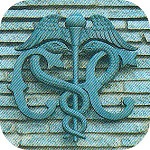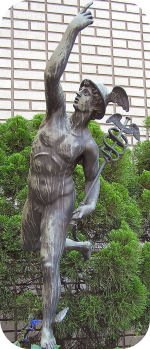|
"I have heard about Shinyu Case again and again, but ..."
For Tsubune's unclear voice,
"You are too modest, I know."
Then, Suga says to three of them, handing out to each the brief chronology
of his own.
"I'd like to listen to me about it later in detail, because it was
a sure turning point of the school history. Before this case several non-overlooking
events occurred while it was under the control of Education Ministry until
Shinyu Case, for 20 and some years.
Meiji 8
(1875) |
|
Commercial Law Institute founded |
| - - - - - |
Meiji 18
(1885) |
|
Transferred to the control of Education Ministry
Merged with Tokyo School of Foreign Studies
School name changed to Tokyo Commercial School
School badge "Mercury" enacted |
Meiji 20
(1887) |
|
Promoted to Tokyo High Commercial School
First regatta with First High School, (lost) |
Meiji 22
(1889) |
|
The first four own boats launched (Suzaku, Byakko, Seiryu, Gembu) |
Meiji 32
(1899) |
|
Separated with Tokyo School of Foreign Studies |
Meiji 33
(1900) |
|
Shibusawa announced "We have to found a Commercial University"
at the party of his Promotion to Baron |
Meiji 34
(1901) |
|
Berlin Declaration--Eight professors drafted the opinion paper "Necessary
to Found a Commercial University at Berlin
(Iwao Ishikawa, Bungo Ishikawa, Noritake Kanda, Yoshio Takimoto, Hidematsu
Tsumura, Tokuzo Fukuda, Kotaro Shida, Hajime Seki) |
Meiji 37
(1904) |
|
The School Song selected: "Choen tohku tanabikite..." |
Meiji 41
(1908) |
|
Economic subject and Commercial subject established in the Law Faculty of Tokyo Imperial University |
Meiji 42
(1909) |
|
Shinyu Case
(Sano and some other professors took voluntary retirement) |
|
|
 Showing the picture, Suga says, "This is the school badge Mercury.
Two snakes are winding round the stick, and two Cs are Commercial College.
It was enacted in Meiji 18 (1885), just when our school Tokyo Commercial
School (TCS) was merged with Tokyo School of Foreign Studies (TSFS)." Showing the picture, Suga says, "This is the school badge Mercury.
Two snakes are winding round the stick, and two Cs are Commercial College.
It was enacted in Meiji 18 (1885), just when our school Tokyo Commercial
School (TCS) was merged with Tokyo School of Foreign Studies (TSFS)."
Mari seems to understand it, since Eriko told her her alma mater Tokyo
University of Foreign Studies (TUFS) used to be TSFS.
Mari probably remembers the proverb "Give him an inch and he'll take
a mile." That is: Fourteen years after the merger, her alma mater
was separated from TCS again and became independent. But at the time the
school buildings originally belonged to her previous school became the
belongings of TCS, and TSFS was forced to move to Kanda-Nishiki area.
About the school badge, Mari agrees. It is now familiar to her.
 Suga, nodding to her, adds "The badge is the top part of the stick of Mercury, the God of Commerce, held by his left hand. Mercury is a god in Roman mythology, but originally Hermes in Greek mythology." Suga, nodding to her, adds "The badge is the top part of the stick of Mercury, the God of Commerce, held by his left hand. Mercury is a god in Roman mythology, but originally Hermes in Greek mythology."
Eriko quickly says, "Mercurius in Latin."
Suga seems to remain in this matter for a while.
"Hermes is not only the god of commerce but the guardian deity of
merchants, shepherds, liars, thieves and travelers. Being the son of the
greatest god Zeus, he was, so to speak, a born fraud with cunning. Strange
enough, he became the god of fortune and good luck in the result of receiving
the caduceus stick from his father. The story is so generous and contradictory,
but every mythology is mysterious by nature, ..."
Mari cuts in on his talk, "Don't get away, elderly."
Then Eriko, holding her laughter, jokes to her,
"You may better check it further."
For Suga himself, he totally ignores their chatting.
"Anyway, our school adopted the top part of the caduceus stick wound
around by two snakes to be the school badge and calls it Mercury."
During the time Tsubune has been checking the brief chronological table,
and says at a stretch and nonstop,
"The next is to build the four boats of the school's own, right? The
boat names are the four mythological creatures in the Chinese constellations.
They are respectively Seiryu (the Azure Dragon of the East), Suzaku (the
Vermilion Bird of the South), Byakko (the White Tiger of the West) and
Gembu (the Black Turtle with a snake of the North). They are surely the
Four Gods. Even so, isn't it a long time ago that the boats were named
so in Meiji 22 (1889) in the days of Tokyo High School? It was eleven years
before Old Shibusawa declared that a commercial college should be founded
and nearly thirty years before the completion of Kanematsu Auditorium."
Suga agrees.
"Yes, it was. I remember the day, when I stood in front of the auditorium
with Eriko-san after the concert this May and saw the monster relieves
on the facade. Then the image of the four boats flashed into my mind. I
am honestly surprised those boat names were taken root in such a long time
ago."
The elderly continues.
"The monsters in the round four relieves represent directions as I
said now and seasons, and each has its own individual characteristic and
origin."
Before Suga finishes the talk, Mari cuts in apparently with confidence.
"It is a common sense in fortune-telling, you see. Their statues were
found in the Nara Ancient Tomb."
Tsubune admires her. Suga answers to Mari, "You know quite well,"
and says,
"The school badge is called Mercury, because it is the caduceus stick
held by Mercury in his left hand, in which two snakes are winding around.
I don't know who thought of the idea, but someone did for these two snakes
as Gembu (the Black Turtle), one of the Four Gods in Chinese mythology,
where a turtle is wrestling wildly with a snake. Did it link up to Shishin
to have considered the school badge as Mercury, or did the idea of Shishin
make the school badge be a deformation of Gembu? Though I have no positive
proof, I guess either of which is right about the relationship between
the school badge and the Shishin."
Suga's own view continues.
"This means the time Shishin (the Four Gods) was regarded as the guardian
deity of our school was around Meiji 18 (1885) when the school badge was
enacted ten years after the foundation of Commercial Law Institute. May
I say so?"
Elderly Suga is idly looking out of the window. The sunshine just before
the sunset fits well to the hedge of gold spindle trees. When he turns
around, those days with illusions seem to be passing before his mind's
eye. He says.
"During the merger days a cutter brought by TSFS originated our school's
boat club. And in Meiji 22 (1889), the club built four boats, each of which
was named as one of the Four Gods and appeared on Sumida River."
Mari is interested this time because TSFS is her alma Mater.
Suga's talk continues further.
"In this way the regatta became the spiritual pillar of our school.
Shishin became an emotional support to unite the school in everything."
Now his voice is lively. Drinking luke-warm coffee slowly, he talks toward
Tsubune.
"I'd like to refer to the Berlin declaration in Meiji 34 (1901). Aren't
the draft makers prominent figures? I may have talked to you before."
Tsubune returns a wry smile this time, too.
According to the document made by Suga,
They, eight professors, were studying in Europe at that time. They gathered
together to Berlin where Yoshio Takimoto stayed by the call of Tokuzo Fukuda
studying at Munich University.
They aggressively sided with the speech of Eiichi Shibusawa the previous
year titled "A university of commerce should be established",
and drafted a big paper aiming at its realization. This is, what we call,
the Berlin declaration.
Zensaku Sano had already returned to Japan and was teaching at the alma
mater. He was surely encouraged.
The three professors, Sano, Tokuzo Fukuda and Hajime Seki, who together
was called "the three doctors," played a role of a tractor for
the promotion to university since then.
But in reality, it was a long, long way to the realization of the purpose. |
|
Elderly Suga gives a sigh of relief and talks toward Tsubune again remembering
something fondly.
"It is the same now as of old that the bond of a school is songs of
dormitories, schools and fights, isn't it? All students and graduates sing
such songs loudly in chorus whenever they get together. There are a number
of famous songs of prewar high schools like: Ah Gyokuhai (Tokyo University),
Miyakozo Yayoi (Hokkaido University), Song Touring around Biwa Lake (Kyoto
University), Miyakono Seihoku (Wasada University), Rikuno Ouja (Keio University),
Surugadai under the Waving White Clouds (Meiji University), ..."
Such song names seem to come out naturally one after another in his mind.
"You know these songs are popular now, too. What about the song of
our school?"
He asks Tsubune, who answers in an instant.
"'Choen Touku', absolutely. The elderly graduates sing it in a loud
voice at the national dormitory song festival every year. That's it."
Eriko and Mari cry at the same time.
"Sing it, please!"
"Yes, sure!"
Tsubune stands up and sings loudly with his hands on the waist.
A little awkward at some parts, but no one teases him.
長煙遠く棚引きて
入相の鐘暮れていく
隅田の流れ夕潮に
オールを軽く浮ばせて
秋西風に嘯きし
その豪快のあとかたや |
|
Smoke hangs over faraway.
The temple bell is ringing in the sunset.
On the stream of Sumida River,
They are pulling oars lightly.
It remembers their dynamic fight
In the autumn western wind. |
|
Tsubune's solo made the atmosphere relaxed, while he is still in his song
and drinks up water in a glass at a stretch.
Elderly Suga stands up and opens the window.
The grass in the garden is brilliant under the blue sky. The mackerel clouds
around Tanzawa are widened faraway.
|